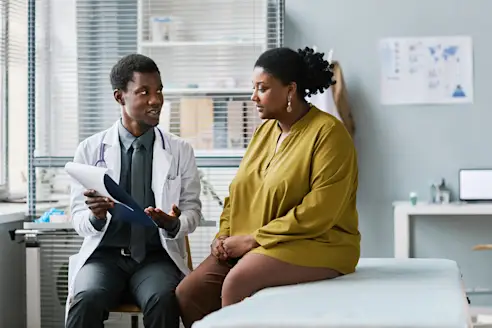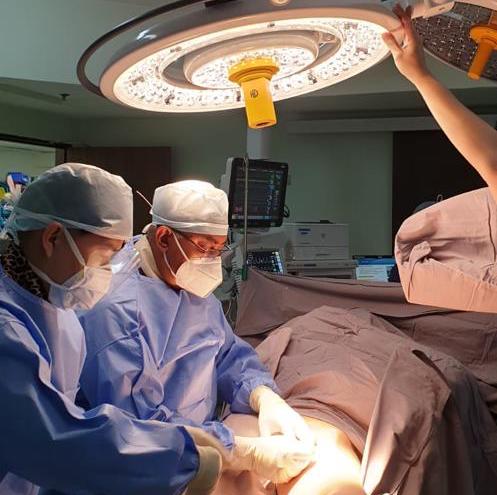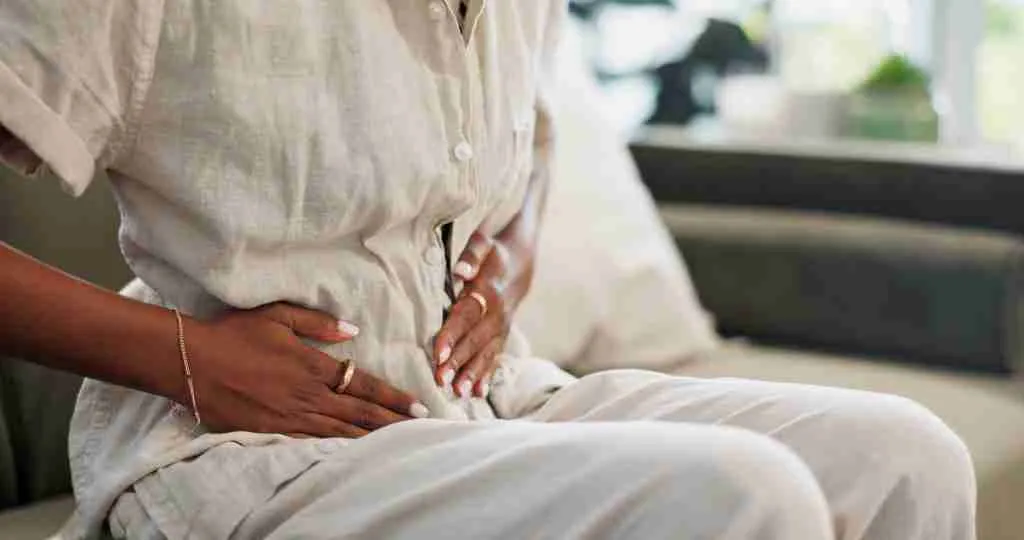Pelvic Congestion Syndrome (PCS) is a condition that affects women when veins in the pelvic area become enlarged and cause long-lasting pain. Many women in Nigeria may experience the symptoms but often do not receive the right diagnosis or treatment.
In this blog, we will explore what PCS is, the challenges of diagnosing it in Nigeria, the treatment options available, and how accessible these treatments are for women across the country.
Understanding Pelvic Congestion Syndrome (PCS)
Pelvic Congestion Syndrome occurs when veins in the lower abdomen, especially around the uterus and ovaries, become widened and filled with blood. This creates pressure and poor circulation, which often leads to chronic pain. Unlike pain that comes and goes, PCS pain usually lasts for months or even years.

Women with PCS often describe a heavy or aching feeling in the pelvis that gets worse after long periods of standing, during sexual activity, or at the end of the day. Other symptoms may include lower back pain, swelling in the legs, and visible varicose veins around the thighs or buttocks.
Recommended: Cost of IVF and Fertility Treatments in Nigeria
The condition is most common in women who have had multiple pregnancies, but it can also affect women who have never given birth. Because the symptoms are similar to other gynecological problems, PCS is often misdiagnosed, which delays treatment.
Treatment Options for Pelvic Congestion Syndrome
Treatment for PCS depends on the severity of the symptoms and the resources available. The main goal is to reduce pain, improve blood flow, and enhance quality of life. Some of the treatment approaches include:
1. Medication and Pain Management
Doctors may prescribe pain relievers or hormonal medications that help reduce vein congestion by controlling blood flow. These are usually the first steps for women with mild to moderate symptoms.
2. Lifestyle Changes
Simple adjustments such as regular exercise, avoiding standing for long periods, and wearing compression garments can help improve circulation and ease discomfort.
3. Minimally Invasive Procedures
One of the most effective treatments for PCS is ovarian vein embolization. This is a non-surgical procedure where a specialist blocks the affected veins to stop blood from pooling. It has a high success rate and a shorter recovery time compared to surgery.
Recommended: Can Blocked Fallopian Tubes (Hydrosalpinx) Be Unblocked Naturally?
4. Surgical Options
In rare cases, surgery may be considered, especially if other treatments do not work. This could involve tying off or removing the affected veins. However, this is less common today because minimally invasive procedures are safer and more effective.
Challenges of Diagnosing PCS in Nigeria
Pelvic Congestion Syndrome is often underdiagnosed in Nigeria due to several challenges in the healthcare system. Many women who experience chronic pelvic pain are first treated for more common conditions such as fibroids, endometriosis, or urinary tract infections. As a result, PCS may go unnoticed for years.

Another major challenge is limited awareness. Both patients and some healthcare providers may not be familiar with the condition, which delays proper evaluation. Women are often told that pelvic pain is a normal part of womanhood, which discourages them from seeking further help.
Diagnostic tools also play a big role. Advanced imaging methods such as pelvic ultrasound, MRI, or venography are essential to confirm PCS, but access to these services is limited in many hospitals across Nigeria. Even when the equipment is available, trained specialists in vascular and interventional radiology are few.
Recommended: Can You Rebuild Your Self-Esteem After a Difficult Sexual Health Diagnosis?
Because of these factors, many women either remain undiagnosed or are misdiagnosed, leaving them without the right treatment for their condition.
Availability of PCS Treatment in Nigeria
Treatment for Pelvic Congestion Syndrome is still developing in Nigeria. While awareness of the condition is growing, access to specialized care remains limited. Most women who experience PCS symptoms first visit gynecologists, who may provide pain management or hormonal therapy. However, more advanced treatment like ovarian vein embolization requires interventional radiologists, and these specialists are concentrated in only a few teaching hospitals and private medical centers.
Some hospitals in major cities such as Lagos, Abuja, and Port Harcourt may have the equipment and expertise to diagnose and treat PCS with modern imaging and minimally invasive procedures. In smaller towns and rural areas, patients often face challenges with referral systems, which can delay treatment.
For women who cannot find advanced treatment locally, medical tourism to other countries is sometimes considered, though this comes with higher costs. As Nigeria’s healthcare system continues to expand and adopt new technologies, the availability of PCS treatment is expected to improve.
Recommended: Lifestyle Adjustments for Managing Lichen Sclerosus Symptoms
Cost and Accessibility of PCS Treatment in Nigeria
The cost of treating Pelvic Congestion Syndrome in Nigeria varies widely depending on the type of care and the hospital. Basic consultations, pain management, and hormonal therapy are relatively affordable and can be accessed in most general and private hospitals. However, advanced diagnostic tests such as MRI scans or venography are more expensive and are usually available only in specialized centers.

Minimally invasive procedures like ovarian vein embolization, which is the gold standard for PCS, are not yet widely available in Nigeria. Where they are offered, the cost can be quite high because of the specialized equipment and expertise required. Many patients may need to seek treatment in private hospitals, which can limit access for women without health insurance or sufficient financial resources.
Public hospitals may offer lower-cost services, but waiting times, limited resources, and lack of specialists can create barriers. Health insurance coverage for PCS treatment is not guaranteed, so patients often pay out of pocket. For those who cannot afford advanced care, managing symptoms with lifestyle changes and medications becomes the only option.
Recommended: How to Find a Specialist for a Rare Genital Pain Disorder
Living with PCS in Nigeria
For many women in Nigeria, living with Pelvic Congestion Syndrome can be physically and emotionally challenging. The chronic pain often interferes with daily activities, work, relationships, and overall quality of life. Because awareness of the condition is low, many women suffer in silence or are told that their pain is “normal,” which can make the experience even more isolating.
Coping with PCS usually involves a combination of medical care and personal strategies. Some women find relief by making lifestyle adjustments such as regular exercise, avoiding long hours of standing, and maintaining a healthy weight. Support from family and friends also plays an important role in helping women manage the emotional burden that comes with chronic pain.
Another challenge is the lack of structured support groups or advocacy platforms for women with PCS in Nigeria. Raising awareness through women’s health programs, online communities, and medical outreach can help patients feel less alone and encourage them to seek specialist care.
Living with PCS requires persistence and self-advocacy, especially in a healthcare system where the condition is not widely recognized. However, with growing awareness and access to better treatment options, women in Nigeria can look forward to improved care and a better quality of life.
Future Outlook for PCS Treatment in Nigeria
The future of Pelvic Congestion Syndrome treatment in Nigeria is gradually becoming more hopeful as awareness of the condition increases among healthcare providers. More gynecologists and radiologists are starting to recognize PCS as a distinct cause of chronic pelvic pain, which means patients may begin to receive more accurate diagnoses rather than being misdiagnosed with other conditions.
Recommended: Emergency Contraceptives in Nigeria: A Comprehensive Guide

As interventional radiology expands in major hospitals, advanced procedures such as ovarian vein embolization could become more widely available. Currently, access to this treatment is limited to a few centers, but ongoing investments in healthcare infrastructure may help bridge the gap. Training more specialists in minimally invasive procedures will also ensure that women with PCS have greater options for effective treatment.
Government support and private sector involvement will play a major role in making treatment more accessible. Increased funding for healthcare equipment and stronger referral systems could reduce delays in diagnosis and care. Advocacy groups and women’s health initiatives can also raise awareness, encouraging women to seek medical help earlier instead of suffering in silence.
In the long term, improvements in technology, healthcare capacity, and awareness are likely to make PCS treatment more affordable and easier to access. With these changes, women in Nigeria can look forward to better management of PCS, reduced suffering, and an overall improvement in quality of life. T
Conclusion
Pelvic Congestion Syndrome is a real and often misunderstood condition that affects many women, yet awareness in Nigeria is still very limited. While diagnosis and treatment can be challenging due to lack of resources and specialists, progress is slowly being made as more healthcare professionals begin to recognize the condition.
Treatment options ranging from pain management and lifestyle changes to advanced procedures like ovarian vein embolization are becoming more known, though access remains concentrated in major cities. Cost and limited insurance coverage also pose barriers, making it harder for many women to get the care they need.
Despite these challenges, the future outlook for PCS treatment in Nigeria is encouraging. With growing medical awareness, improvements in healthcare infrastructure, and the potential for advocacy and education, more women will be able to find relief and live healthier lives.
Ultimately, better recognition of PCS and increased access to treatment will not only ease suffering but also empower women in Nigeria to take charge of their reproductive health.
